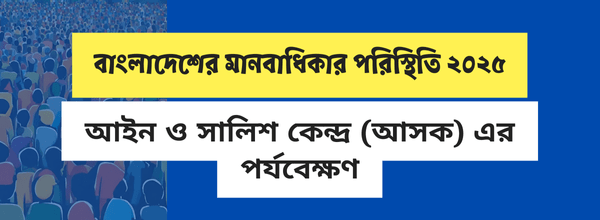“I was scared for my life, so I didn’t look back,” reveals 17-year-old Farhana (pseudonym), who escaped from her in-laws’ torturous claws and took refuge under Ain o Salish Kendra (ASK)’s shelter home.
She looks like a teenager despite her tall and large figure. Her healthy braided hair falls against her dark kameez as she eagerly gestures with her head when speaking.
At the early age of 15 years, in 2017, Farhana was married. Her husband left to work in Gazipur while she moved into her in-laws in Rajshahi. Shortly after the marriage, Farhana passed her Secondary School Certificate (SSC) Examinations with high grades and wanted to study further; however, her in-laws refused to allow her to continue on the path of education.
“During the initial period of our marriage, there was no issue; life seemed quite simple and fine as I was still studying back then. However, six months into our marriage, my in-laws began to repeatedly bring up the topic of dowry. The situation only worsened over time. Eventually, my husband refused to stand by my side and soon I was being tortured not only verbally and emotionally, but physically as well, by both my in-laws and husband,” recollects Farhana. Her voice is low and meek, but with her bright and expressive eyes she is quite persistent in sharing her story of daily torture.
Farhana came from a poor background. She lost her mother at a tender age. Her father is a local government representative.
Every time Farhana reached out to her father for help to escape from the torturous life she was living, she was faced with threats from him as well. The only other man whom she could have looked upto, to seek comfort from, returned her from his doorstep every single time, threatening to end her life if she brings down his image. Keeping her composure, she explains: “It was rather a matter of shame for his social position. He used to tell me that if I returned home, he would either chop me into pieces and throw me into the river, or inject me with enough drugs and send me to a mental asylum.”
After 18 months of marriage, Farhana became pregnant. Although her husband wanted to keep the baby, her in-laws were not on the same page. It seemed that this difference in thought brought about a fresh wave on onslaught of torture against her, bringing her closer and closer to the decision of giving up on this married life.
After an especially violent beating, Famida started bleeding heavily. As fate would have it, at the hospital, she was informed that the results of the ultra-sonogram showed that due to the heavy bleeding and blood loss, she had a miscarriage. She no longer had her baby with her.
“It was at that point in time that I decided I needed to escape from this life. If they were cruel enough to kill my baby, it wouldn’t take them long to kill me too,” reveals Farhana. Her big, round eyes sparkled as she shared her feelings of growing anticipation and fear for taking a step that was quite a daring one for.
A few days later, Farhana finally made it. She succeeded in getting out of the house and to Dhaka. She left the house with nothing but a bit of her own gold jewelleries, and once she reached Dhaka, she took refuge at a house in Gazipur which belonged to her friend’s relative. While at Gazipur, she started to work as a lab assistant at a local hospital.
Regrettably, being the influential person her father is, he succeeded in tracing her phone number and resorted to continuously threaten her to move back with her in-laws. That was when she knew that she needed some professional assistance to start a new, safe life. Fortunately, a friend of hers was aware of the services provided by ASK and aided her to connect with ASK accordingly, where she sought shelter.
She is now undertaking psycho-social counselling and has also appealed for divorce with the help of ASK.
Farhana’s father and in-laws contacted her several times at the shelter to try to take her back home but she has stood her ground refusing to return to that life again.
“Whatever has happened is now over. I don’t want my tormentors to receive punishment. I just want them to leave me alone, so that I can live my own life properly at my own will,” she states despite everything.
Farhana is planning to find a job once she leaves ASK’s shelter home.
Despite the government’s various efforts, dowry-related domestic violence rates are still very high in Bangladesh. A survey of national newspapers conducted by ASK shows that during the first eight months of 2019, a total of 110 such cases were reported in the national dailies, among which 41 were physically tortured and 63 were tortured to death.
Every year, ASK provides legal support to 17,000 to 18,000 cases, of which more than a thousand are domestic violence-related mediation cases. This project is partially funded by the Danish International Development Agency (DANIDA).















 Visit Today : 240
Visit Today : 240 Visit Yesterday : 800
Visit Yesterday : 800 Total Visit : 335971
Total Visit : 335971 Who's Online : 6
Who's Online : 6